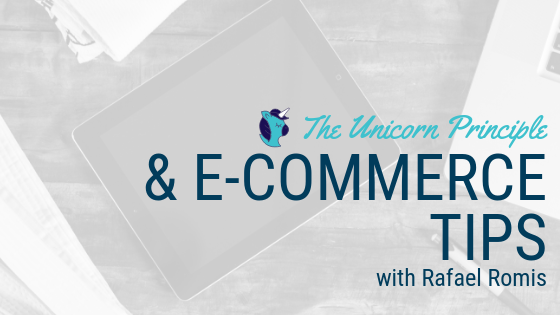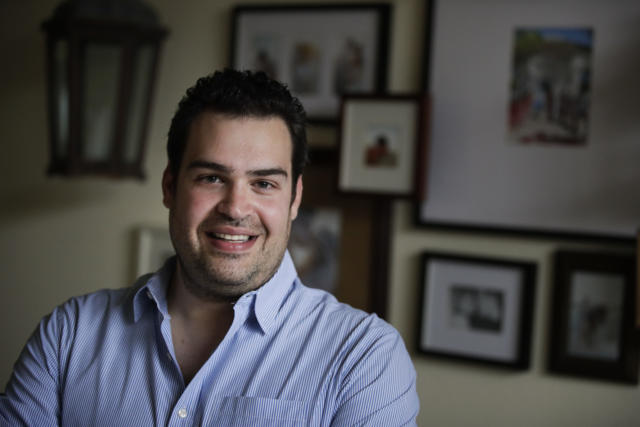Rafael Romis is the founder of the award-winning creative agency, Generate Culture.
He’s accumulated over 10 years of experience in the digital marketing space and has successfully launched over 230 projects for both fortune 500 and startup clients worldwide.
Currently, he’s publishing a book on the Unicorn Principle, a concept that recognizes the value of individuality in marketing.
On the podcast, Rafael talks about the Unicorn Principle and the process of starting an e-commerce company.
What is the Unicorn Principle?
Rafael coined the Unicorn Principle after working with some make-up artists who wanted to build a brand. They had a unique product, highly pigmented lipstick colors, which couldn’t be found anywhere else. Before putting it up for sale, they would post pictures of the product to social media.
When the website finally when up, everything was sold out in less than an hour.
This is the Unicorn Principle.
In fewer words, it’s the concept of finding something unique within a company or product and leveraging it to make the sales.
Are There Real-World Examples of the Unicorn Principle?
Outside of Rafael’s personal experience, the Unicorn Principle can be found elsewhere.
One such example is Fenty Beauty, which had great success in offering makeup for certain skin tones that weren’t being properly served.
This is an interesting example, as Fenty purposefully went for a unique product, in order to fill a gap in the market. It also had the added benefit of the perception of compassion, in that they were serving certain demographics that weren’t being catered to.
Another example is Jeffree Star Cosmetics, which is, as its name suggests, a cosmetics company built around the style of Jeffree Star, a YouTube personality. Even though other companies might offer similar products, Jeffree Star Cosmetics had the unique style of Star on their side, which led them to success.
A slightly different example is when Apple went after PC’s market dominance by becoming the “cool” brand. They didn’t rely on boring specs like PC did, but, instead, music and culture, which hadn’t been done by a computer company before.
All of these brand either harnessed their existing individuality or created their individuality, which set them apart from their competitors and/or tapped into an untouched market.
How Important is Your Brand?
Very important.
With so many different companies out there offering similar products, Rafael finds that the persona around the brand is what sways people one way or the other.
Rafael uses the example of a stretchy belt that he saw in Greece. He looked up “stretchy belts” on Amazon and found there to be over 15 different providers.
With price varying only slightly, the consumer is going to choose the company they most identify with positive feelings.
What Causes Most Startups to Fail?
Poor planning isn’t just one of the biggest issues with startups, Rafael says, it’s the “key reason why companies fail.”
You need to put in the research and do a lot of thinking if you want to have a successful brand or product.
Rafael uses himself as an example.
He’s six-foot-seven, Jewish and from Greece, which makes him a unique person on the surface. But companies don’t choose to work with him for these unique reasons. They choose to work with him because of his unique work history.
In this same way, a company that hasn’t thought out what foot it wants to put forward will often end up flat on its face.
Focus is incredibly important, especially when locating your audience and figuring out what they want. If you can do that, you’re half-way there.
How Do You Best Communicate Your Originality?
Rafael believes you should spotlight your uniqueness everywhere on your website. In fact, you should mentally rewire your thinking from selling a product to selling the unique aspect of that product.
The homepage, in particular, is key when stressing the originality of your product. Then, on the product page, you can delve into the product as a whole. Once they’re at the product page, you probably have them, so you want to guide them to the check-out page from there.
Other than your website, your social media presence should also be focusing on what makes your product unique. In fact, Rafael remembers one clothing company that took a stand against photoshopped models and made a point of showing off their clothing only on non-photoshopped models.
They spread these photos on social media and it became a trending hashtag. This campaign became so successful, the company actually worked it into their overall brand.
What is the First Step to Maximizing the Unicorn Principle?
According to Rafael, the first step is to find your audience and to be very granular about it. For example, Rafael asked a guy selling floaties who his audience was, and the guy said, “everybody.”
Rafael had to get the guy to think more specifically, because you don’t want to spend resources targeting people who might buy your product. You want to target those most likely to buy your product.
Once you know who they are, find out what they do, where they hang out, and what they talk about. Listen to what they’re passionate about and try to tie your product in with that.
Where Can You Learn More About Rafael Romis and the Unicorn Principle?
If you’re still curious about the Unicorn Principle and Rafael’s other ideas, you can email him at raphael@generateculture.com and he will send you a PDF with more information.
You can also visit his website, where he has a blog with in-depth marketing wisdom. And, you can follow Rafael on Twitter and LinkedIn.
About Rafael Romis
Born and raised in Greece, studied in Kent, worked in London, and set his roots in Los Angeles, California where he founded Weberous Web Design, an award-winning full-service creative agency specializing in eCommerce and informational websites.
As a leading expert in marketing, strategy and business development, Rafael has launched and overseen hundreds of websites and marketing campaigns.













